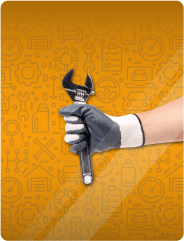ABS Sensors
What is an ABS sensor?
An ABS sensor is an electronic device that is part of the anti lock braking system (known as ABS). In an event where the brakes are strongly applied a vehicle without ABS will have the wheels lock up and stop rotating leading to the vehicle skidding and losing steering control. The heat generated by the skidding tyres also increases the stopping distance as the tyres lose rubber and get hot which creates less grip.
An ABS sensor detects when the wheels have locked during heavy braking so that the ABS system can control how the brake pressure is applied. The ABS system applies and releases the brake pressure so that the wheels do not skid and the vehicle can still be steered out of danger and also reduces the stopping distance.
How do I choose the correct clutch kit?
Choosing the correct sensor for your vehicle quite often depends on the brake system fitted to your vehicle. We would recommend that you give attention to the compatibility notes listed with the part that you believe to be the correct replacement.
Manufacturer of the brake system
Design of the connector. This can be different depending on the manufacturer of the brake system
Manual or automatic transmission
If the vehicle has traction or stability control
Vehicle manufacture date (this is not the date the vehicle was registered but the date it was made
Engine number sequence (up to or after as specific number/letter
VIN (chassis number) sequence (up to or after as specific number/letter
What brand of ABS sensor should I choose?
Bosch and Valeo manufacture ABS sensors for the original car brands however there are a good number of high quality aftermarket brands that meet or exceed the original makers specifications. Brands such as Blue Print, Febi and Cambiare offer long warranties which show they have confidence in their products and often have a cheaper price point. A brands reputation is important however budget is a consideration for many. The choice is often based between those two factors.
How can I tell my ABS sensor needs replacing?
The braking system is one of the most important safety systems in your vehicle. If you have any concerns over how it is performing we would always recommend that you have your vehicle inspected by a qualified mechanic to receive an accurate diagnosis.
Some of the symptoms of a faulty ABS sensor are:
The ABS light is illuminated on the dash while driving
Brake pedal pulsates when using the brakes
The ABS system does not work
The traction control system is showing a fault or will not turn on
 Proud to be a UK-based company
Proud to be a UK-based company Contact us
Contact us



